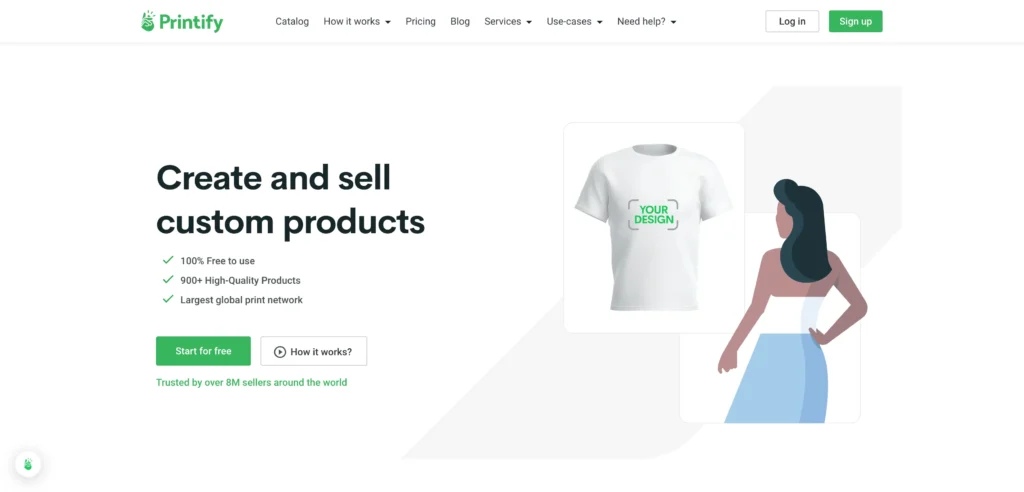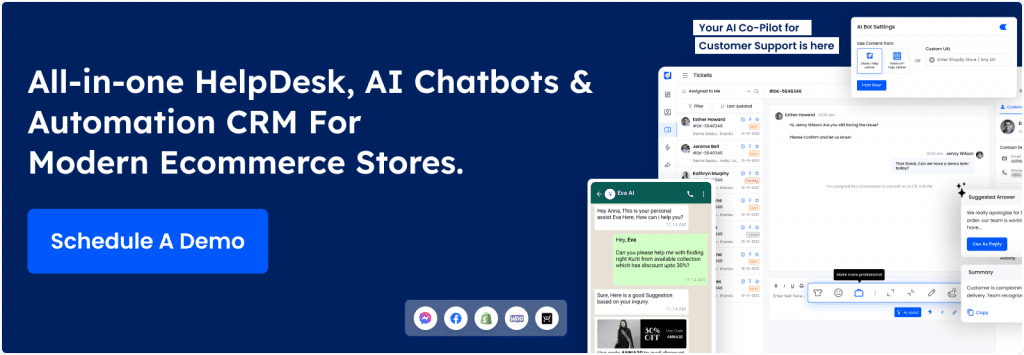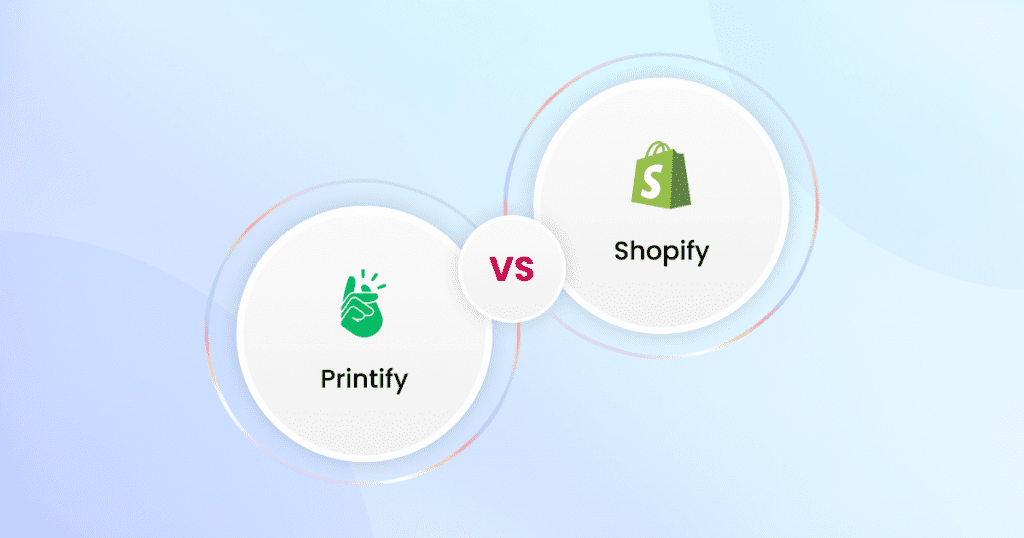Ecommerce entrepreneurs have plenty of tools to choose from, but when it comes to Printify vs Shopify, the real question is: which one fits your growth plan?If you’re launching a custom print-on-demand (POD) business, Printify can be a game-changer with its easy setup and no upfront costs.
But if you’re looking for a full-scale ecommerce platform with control over every aspect of your business—from store design to advanced sales channels—Shopify stands out. So how do you decide?
Here’s the deal: Printify is perfect for starting out small with POD products, but Shopify’s real strength is scaling a store. In this comparison, we’ll cover everything from pricing and customization to how each platform handles order fulfillment.
Plus, we’ll dig into how each can help you grow, whether you’re looking to keep it lean or expand to something bigger.
Ready to find out which one fits your business goals? Let’s dive in!
What is Shopify?

Shopify is more than just an ecommerce platform—it’s an all-in-one solution that helps you create, manage, and grow your online store. Whether you’re selling handmade products or a full catalog of goods, Shopify offers a range of features designed to help businesses of all sizes thrive. With Shopify, you can:
- Build a custom online store with no coding knowledge using intuitive templates.
- Sell across multiple sales channels, like social media, Amazon, or even in person with its POS system.
- Take advantage of abandoned cart recovery, which automatically sends follow-up emails to customers who left without checking out.
- Access powerful SEO tools to boost your store’s visibility in search results.
Shopify is particularly strong for businesses looking to scale. As you grow, the platform allows you to handle larger volumes of orders, add more products, and even manage complex shipping options. For entrepreneurs who need flexibility and control over how they sell, Shopify is the go-to solution.
But there’s a cost to all this functionality. Shopify requires monthly fees (starting at $39 for the Basic plan), and additional transaction fees if you’re not using Shopify Payments. It’s ideal for those who want a full ecommerce experience, but it comes with a price tag.
What is Printify?

Printify is a print-on-demand platform that’s perfect for entrepreneurs looking to sell custom-designed products without handling inventory. If you’ve ever wanted to create your own line of custom t-shirts, hoodies, or accessories, Printify lets you design products and have them automatically printed and shipped to your customers when an order comes in.
Here’s how it works:
- You upload your designs to Printify’s mockup generator and apply them to over 850 products.
- Once an order is placed, Printify routes it to one of its many global print providers, who print and ship the item directly to the customer.
- You only pay for the product and shipping after a sale is made, so there are no upfront costs for inventory.
Printify’s model is low-risk, making it great for small businesses or anyone starting out in ecommerce. It’s free to use, but for $24.99 a month, you can upgrade to a premium plan, which offers up to 20% discounts on all products. It’s easy to integrate with platforms like Shopify, Etsy, and WooCommerce, allowing you to sell across multiple channels.
However, Printify’s focus on POD means it’s limited if you want to grow beyond custom products. It’s perfect for designers or artists who want to monetize their creativity but lacks the broader ecommerce functionality of Shopify.
Comparing Printify Vs Shopify Pricing & Fees
Here’s a simple table comparing Printify and Shopify pricing:
| Feature | Printify | Shopify |
|---|---|---|
| Subscription Costs | Free Plan Premium: $24.99/month | Basic: $39/month Shopify: $105/month Advanced: $399/month |
| Transaction Fees | None | 0% – 2% (depending on plan) |
| Product Costs | Varies by product and print provider | No built-in product costs (you source or produce your own products) |
| Shipping Costs | Varies by print provider and destination | Varies (you set shipping rates or use third-party apps) |
| Additional Costs | Samples, premium services (optional) | Apps, themes, payment processing fees (varies) |
| Discounts | Up to 20% off products (Premium plan) | None, but shipping discounts available on some plans |
Printify is more cost-effective for those starting with print-on-demand due to its free plan and no transaction fees. Shopify, while pricier, provides a more comprehensive solution for businesses looking to scale beyond POD.
Shopify charges a monthly subscription, starting at $39 for the Basic plan. This includes a full suite of ecommerce tools, from abandoned cart recovery to POS integration. Shopify also takes a small percentage of your sales as transaction fees (0% to 2% depending on your plan). While the cost is higher, you’re paying for a more comprehensive service that can handle more complex businesses.
Printify, on the other hand, is free to start using. You only pay for each product you sell, plus the shipping cost, which varies depending on your print provider and where you’re shipping to. If you want to unlock discounts and scale more efficiently, the Premium plan at $24.99/month offers a 20% discount on all products. There are no transaction fees, but the shipping costs can add up depending on your print provider.
In short: Shopify is pricier upfront, but offers a wide range of tools for ecommerce growth. Printify is a low-cost option, perfect for entrepreneurs focused on custom products with no inventory investment.

Ease of Use
Both platforms aim to be user-friendly, but they serve different needs.
Shopify is designed for all types of ecommerce businesses and is known for its easy setup. You can customize your store using templates and drag-and-drop features. However, managing larger inventories, setting up shipping rules, or integrating third-party apps can add complexity. That said, Shopify’s intuitive dashboard makes it easy to track orders, manage products, and handle day-to-day operations.
Printify is simpler by nature. It focuses on POD, so the platform is streamlined for that purpose. You choose a product, add your design, and publish it to your store. The simplicity is great if you only want to sell custom products, but it’s not as flexible if you want to manage a broader ecommerce store with diverse product lines.
For those who prefer minimal setup and want to quickly start selling custom products, Printify wins on ease of use. For those who need more customization and control over their store, Shopify is the better choice.
Order Fulfillment & Shipping
When it comes to fulfilling orders, Shopify gives you complete control. You can:
- Handle fulfillment manually by packing and shipping yourself.
- Use third-party fulfillment centers that store and ship products on your behalf.
- Automate the entire process through dropshipping partners or apps like Oberlo.
You also get advanced shipping options, like calculated shipping rates, free shipping offers, or local delivery. For businesses shipping a variety of products, Shopify’s shipping flexibility is unmatched.
Printify, however, automates the entire fulfillment process for you. Once a customer places an order, it is automatically sent to a print provider, who prints and ships the product. You don’t have to touch a thing. This hands-off approach is ideal for POD businesses, but you lose control over the shipping experience. Shipping times and costs can vary depending on your provider, which could affect customer satisfaction.
In summary: Shopify is better for businesses that need full control over their fulfillment process. Printify is great for entrepreneurs who want to outsource everything and focus on designing products.
Customizability
Shopify offers nearly endless customization options for your online store. From hundreds of templates to choose from to advanced theme editing, you can build a store that reflects your brand perfectly. Shopify also has a marketplace of over 8,000 apps, allowing you to add features like email marketing, customer reviews, and SEO optimization. If you need a unique, fully branded experience, Shopify is your platform.
Printify, on the other hand, is more limited. While you can customize products, you don’t get the same level of control over the store itself. Printify works best as an addition to an existing store, especially if you use it with Shopify. You design your products and let Printify handle the printing and shipping, but you’ll need a different platform to create a storefront.

Who Should Choose Shopify?
Shopify is ideal for:
- Businesses with diverse product lines: If you’re selling more than just custom-designed products, Shopify gives you the flexibility to grow your catalog.
- Entrepreneurs looking to scale: With its advanced features and scalability, Shopify is great for businesses planning to grow rapidly.
- Stores that need multiple sales channels: Whether you want to sell in person, through social media, or across multiple marketplaces, Shopify integrates it all seamlessly.
Who Should Choose Printify?
Printify works best for:
- Artists and designers: If your focus is on creating and selling custom-designed products, Printify makes it easy to get started with little upfront cost.
- POD businesses: Entrepreneurs who want to test product ideas without investing in inventory will benefit from Printify’s print-on-demand model.
- Smaller operations: If you’re looking to run a lean operation and don’t need the full ecommerce power of Shopify, Printify’s simplicity is a perfect fit.
Conclusion
Ultimately, both platforms offer something valuable depending on your business model. If you’re focused on scaling a fully-fledged ecommerce store with multiple sales channels and advanced customization, Shopify is the way to go. But if you want a low-risk, low-cost way to sell custom products with minimal setup, Printify will serve you well.
Which one will help you hit your business goals faster?

Some common questions people ask :
Can I use Printify with Shopify?
Yes, Printify integrates seamlessly with Shopify. You can use Shopify to create a fully functional online store, and Printify will handle the print-on-demand fulfillment. This allows you to sell custom-designed products through your Shopify store without managing inventory or shipping.
Which is better for selling custom products, Shopify or Printify?
If you’re focused on selling custom-designed products, Printify is ideal because of its extensive network of print providers and easy-to-use mockup generator. However, Shopify offers more advanced ecommerce features, like a broader range of apps, payment options, and scalability, making it better for businesses that want to sell both custom and non-custom products.
How do the costs compare between Printify and Shopify?
Printify is free to start, but you pay for each product you sell, along with shipping costs. It also offers a premium plan for $24.99/month that provides product discounts. Shopify starts at $39/month for the basic plan and includes additional transaction fees unless you use Shopify Payments. It’s more expensive upfront but offers a more comprehensive ecommerce platform, especially for scaling businesses.
Why is shipping so expensive on printify
Printify’s shipping costs can be high due to factors like product size, shipping method, destination, and varying rates from different print providers, which can make pricing inconsistent.


